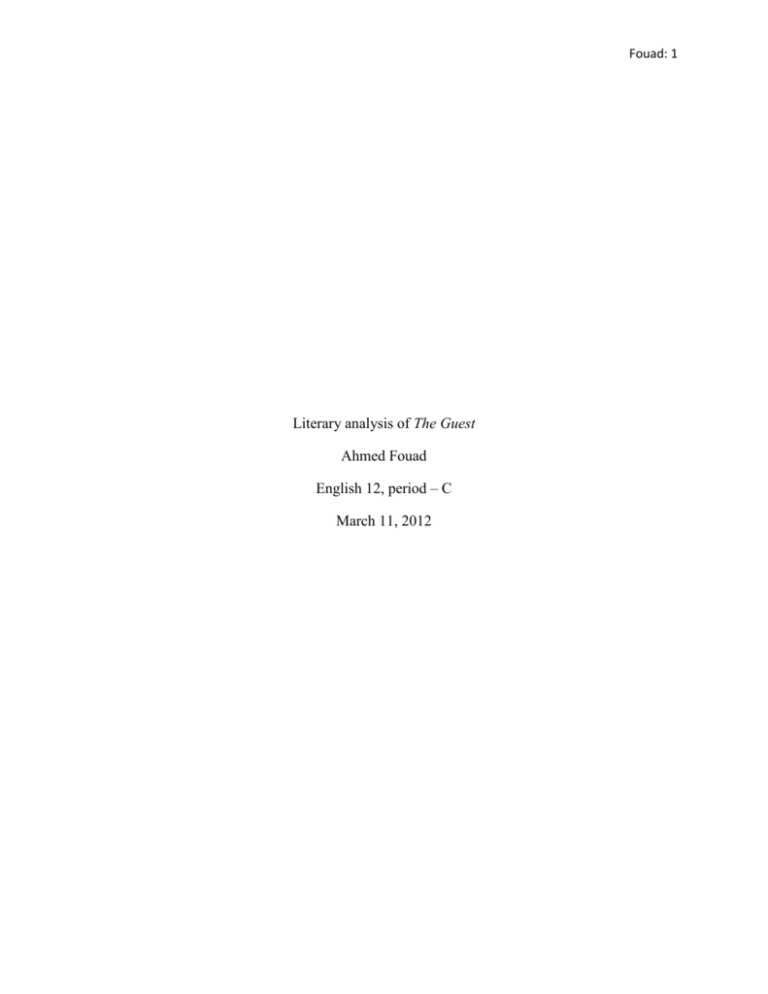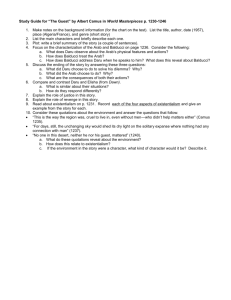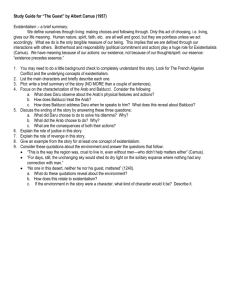Literary analysis, the guest
advertisement

Fouad: 1 Literary analysis of The Guest Ahmed Fouad English 12, period – C March 11, 2012 Fouad: 2 I. Introduction A. “But I will not hand him over. Fight, yes, if I have to. But not that.” B. Written by Albert Camus C. This story is about an Arab who was taken to a plateau to spend the night, and then be taken to a prison in El Ameur. D. Through analyzing The Guest, it is clear that it has a setting, a conflict, point of view, plot, character, and a theme, which are all the elements found in a short story. II. Setting A. Desert B. “They were toiling onward, making slow progress in the snow, among the stones, on the vast expanse of the high, deserted plateau.” C. Why the desert is where the story takes place III. Plot A. Introduction B. Rising action C. Climax D. Falling action E. Conclusion Fouad: 3 IV. Conflict A. Man Vs. Self V. Characters A. Schoolmaster Daru is the protagonist B. Gendarme Balducci is the antagonist C. Arab is neither VI. Theme A. Existentialism VII. Point of view A. Third person limited B. Objective VIII. Conclusion Fouad: 4 Ahmed Fouad Mrs. Timm Period – C 11/3/2012 Literary analysis of The Guest “But I will not hand him over. Fight, yes, if I have to. But not that.” This quote shows that everyone has a choice; whether it is good, or bad. Daru could just obey the orders but then he submits to what he is told, which takes his choice away. The Guest was written by Albert Camus, a Polish writer and through this story he showed the right and freedom of existentialism. This story is about an Arab who was taken to a plateau to spend the night, and then be taken to a prison in El Ameur. The law abiding gendarme Balducci, accompanies the prisoner to the plateau and then gives him up to Daru, who then thinks over night and then decides to give the Arab the choice of his own fate; to escape or to be punished. Through analyzing The Guest, it is clear that it has a setting, a conflict, point of view, plot, character, and a theme, which are all the elements found in a short story. The Guest takes place in a plateau located in a middle of a dessert. “They were toiling onward, making slow progress in the snow, among the stones, on the vast expanse of the high, deserted plateau.” This quote shows that no one lives there, meaning there is no food or water which shows the reader that it is a desert. The story took place there because a plateau in a dessert is like a place of no escape; if you run off then the dessert will claim your life, but if you stay, then you are safe. It could not take place somewhere else since this cannot be done in a location such as the countryside. Fouad: 5 “Balducci was holding on the end of a rope an Arab who was walking behind him with hands bound and head lowered” This is the introduction of this story. It is when the schoolmaster is visited by two people. His old friend, gendarme Balducci and his prisoner, the Arab. The rising action is when the Arab is left in custody of schoolmaster to take him to prison the next day, since Balducci is required back in El Ameur to guard it, and they need as many men to do so. This is shown in the quote “ I am going back to El Ameur. And you will deliver this fellow to Tinguit.” “Now I am leaving you.” Is where the story reached its climax. That is when the schoolmaster lets the Arab do what he thinks is right and let him decide his fate. That is something that is unexpected to do since no one ever lets a murderer chose whether he should go to prison or not. The falling action of The Guest is when the Arab goes in the direction of the prison, which is unexpected because people try to escape prison at all cost, and yet he went but it may be because of his religion; for murder is wrong. This is shown in the quote “In that slight haze, Daru, with heavy heart, made out the Arab walking slowly on the road to prison.” Daru the schoolmaster returns to the plateau and sees the words “You handed over our brother. You will pay for this.” This means that there are people looking for the Arab and now they think that Daru handed him over. This was the conclusion of this great story. The conflict in The Guest is “Man VS. Self” where the Schoolmaster has to take the Arab to prison but instead of doing that the Arab is given a choice; whether to go to prison and accept the punishment that comes for the crime committed, or to run away and pretend like it never happened. The Schoolmaster is the protagonist of this story since it is read from a third person, it will be aimed at him, for he is a flexible character amongst the static ones which makes him the center of attention. The Gendarme Balducci however, is the antagonist since he is a static Fouad: 6 character and is convinced that the Arab must go to prison no matter what others think. The Arab in this story is a static character but is not the main character and does not work against the protagonist, which makes him neither a protagonist, nor antagonist. The theme of this story is existentialism. In simple terms, it is the choice. We may get pressured into choosing something and accept it with its consequences or to chose them for themselves. However, a lot of people prefer to choose someone else to choose for them because it makes their lives easier and then they can blame someone else for their consequences. In The Guest the schoolmaster had the choice of turning the Arab in to the police, or letting him go. But instead of doing either of them, he gave the choice to the Arab himself, this is existentialism. The Guest is told from a Limited third person point of view and an objective point of view since no thoughts were described but only what was happening at that moment. If it was told from a characters point of view, such as what the Arab felt and thought at the time of being brought to a plateau then it would be first person limited. Through analyzing The Guest, it is clear that it has a setting, a conflict, point of view, plot, character, and a theme, which are all the elements found in a short story. The Guest is a very interesting short story that tells people not that there are murderers, deserts or weapons but that there is a right of choice, and we all have it. But can we choose to do it for ourselves or let someone else do it for us is all up to us to decide. Existentialism is given to all, but will we use it by ourselves, or submit to other’s will.



